

Kids Without Gardens More Likely to Get Fat. Action Points Note that this study was published as an abstract and presented at a conference.

These data and conclusions should be considered to be preliminary until published in a peer-reviewed journal.Note that this observational study showed that lack of access to "green space" was associated with a greater risk of childhood obesity. STOCKHOLM -- Children who grow up in dodgy neighborhoods and have little access to a garden or green space are at risk of becoming obese by the time they are 7 years old, researchers said here. Children were 14% more likely to be overweight or obese if they lived in an area where access to green space was limited (OR 1.14, 95% CI 1.02-1.27) and were 35% more likely (OR 1.35, 95% CI 1.16-1.58)] if they grew up without a garden to frolic in, said Giel Nijpels, MD, PhD, professor of general practice medicine at the VU Medical Center, Amsterdam. The Decline of Play and Rise in Children's Mental Disorders. THE HYBRID MIND: The More High-Tech Education Becomes, The More Nature Our Children Need.
By Richard Louv on March 30th, 2015 On April 7, as part of C&NN’s 2015 Children & Nature Conference in Austin, Texas, a full day will be devoted to the role of technology in children’s experience of nature.
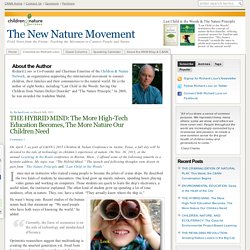
On Nov. 16, 2013, at the annual Learning & the Brain conference in Boston, Mass., I offered some of the following remarks in a keynote address. My topic was “The Hybrid Mind.” Playgrounds need to be more challenging, UBC researcher says. Children's playgrounds don't encourage enough risky play, a University of British Columbia researcher says.
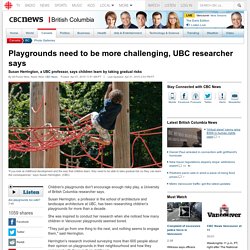
Why so many kids can’t sit still in school today. The Centers for Disease Control tells us that in recent years there has been a jump in the percentage of young people diagnosed with Attention Deficit and Hyperactivity Disorder, commonly known as ADHD: 7.8 percent in 2003 to 9.5 percent in 2007 and to 11 percent in 2011.
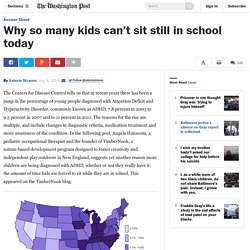
The reasons for the rise are multiple, and include changes in diagnostic criteria, medication treatment and more awareness of the condition. In the following post, Angela Hanscom, a pediatric occupational therapist and the founder of TimberNook, a nature-based development program designed to foster creativity and independent play outdoors in New England, suggests yet another reason more children are being diagnosed with ADHD, whether or not they really have it: the amount of time kids are forced to sit while they are in school.
This appeared on the TimberNook blog. State-based Prevalence Data of ADHD Diagnosis (2011-2012): Children CURRENTLY diagnosed with ADHD (Centers for Disease Control) Hyper-parenting is negatively associated with physical activity among 7–12year olds. Open Access Highlights Little emperor hyper-parenting was negatively related to physical activity.
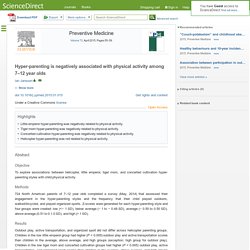
Tiger mom hyper-parenting was negatively related to physical activity. Concerted cultivation hyper-parenting was negatively related to physical activity. Helicopter hyper-parenting was not related to physical activity. Abstract Objective. 1&1 WebDesk – Login. The Road to Hell is paved with good intentions. This post first appeared at Playground Professions 2-10-15 I recently posted this image of the ThudGuard helmet on the Linkedin Playground Safety: Balancing Play Value & Injury Prevention group and asked what the members thought about it.
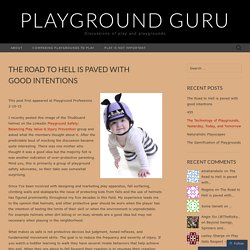
After the predictable bout of mocking the discussion became quite interesting. There was one mother who thought it was a good idea but the majority felt is was another indication of over-protective parenting. Mind you, this is primarily a group of playground safety advocates, so their take was somewhat surprising. Since I’ve been involved with designing and marketing play apparatus, fall surfacing, climbing walls and skateparks the issue of protecting kids from falls and the use of helmets has figured prominently throughout my five decades in this field. What makes us safe is not protective devices but judgment, honed reflexes, and fundamental movement skills. The question arises then, what is the impact of using a safety helmet? Theconversation. In order to make young children “school ready”, the English government is now encouraging parents to place their children in school nurseries shortly after their second birthday.
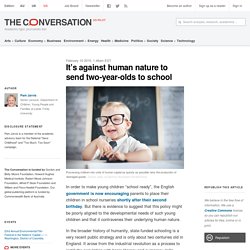
But there is evidence to suggest that this policy might be poorly aligned to the developmental needs of such young children and that it contravenes their underlying human nature. In the broader history of humanity, state-funded schooling is a very recent public strategy and is only about two centuries old in England. It arose from the industrial revolution as a process to instill the population with basic literacy and numeracy skills. Five Ways to Get Your Children Out Walking
Getting children into walking at a young age can influence their habits in later life - hopefully leading to a healthier, more active lifestyle.

So how can you get your young ones interesting in walking? Here are my top 5 ways to get your children out walking... 1. Make the Idea Sound like Fun If the thought of going for a walk fills them with dread, then ask instead "who wants to explore the forest". Readinginkindergarten_online-1.pdf. Hacking childhood obesity: Can advertising save the world?
Find data. The problem with education? Children aren't feral enough. What is the best way to knacker a child's education?

Force him or her to spend too long in the classroom. An overview of research into outdoor education by King's College London found that children who spend time learning in natural environments "perform better in reading, mathematics, science and social studies". Exploring the natural world "makes other school subjects rich and relevant and gets apathetic students excited about learning". Fieldwork in the countryside, a British study finds, improves long-term memory. Dozens of papers report sharp improvements in attention when children are exposed to wildlife and the great outdoors. Studies of the programmes run by The Wilderness Foundation UK, which takes troubled teenagers into the mountains, found that their self-control, self-awareness and behaviour all improved.
Last week I saw the evidence myself. Let the Children Play! - Why Children Should Be Playing Outside This Winter The millennials generation are the first to grow up with computer technology at their fingertips.
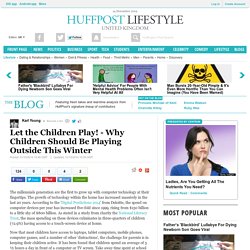
The growth of technology within the home has increased massively in the last 20 years. According to the 'Digital Predictions 2014' from Deloitte, the spend on computer devices per year has increased five-fold since 1999, rising from $150 billion to a little shy of $800 billion. As stated in a study from charity the National Literacy Trust, the mass spending on these devices culminates in three-quarters of children (72.9%) having access to a touch-screen device at home. Now that most children have access to laptops, tablet computers, mobile phones, computer games, and a number of other 'distractions', the challenge for parents is in keeping their children active. It has been found that children spend an average of 5 ½ hours a day in front of a computer or TV screen.
Andy Kirkpatrick. Children 'prefer to play outdoors than watch TV' 28 October 2014Last updated at 13:41 ET The adults surveyed agreed that it was good for children to take risks when playing Children would rather be playing outdoors than watching television, but parents' concerns keep them indoors, a survey suggests. The poll of nearly 3,000 parents and children by Eureka Children's Museum in West Yorkshire found 81% of children prefer playing outside to watching TV. But half of the parents and carers surveyed said they did not let their child leave their home or garden. Growing Schools. How children lost the right to roam in four generations. By DAVID DERBYSHIRE Last updated at 01:03 15 June 2007 When George Thomas was eight he walked everywhere.
Mom Lets Son, 7, Stay Home Alone 30 Minutes and “The Doctors” Weigh In. Readers — Let’s hear it for Lizzie Heiselt, the MotherRunner blogger who wrote about letting her son, 7, stay home while she ran an errand. She took heat for the usual “What if…?” S but stayed calm and fantastically poised on The Doctors, a show that sometimes sneers at helicopter parenting and sometimes sneers at Free-Rangers (when I was on, it was the latter). Clearly, all the good doctors want is good ratings, so at the end of the Lizzie interview they resort to the national pastime of dreaming up fantabulous circumstances to scare her and the audience with.
(E.g., “But aren’t you worried that there are creeps are around every corner, assiduously reading mommy blogs. who will now be focused on your son, your apartment building and your errand schedule, so the minute you leave to get the dry cleaning, they could run in and snatch your kid???” What Should A 4-Year-Old Know? Children Who Never Play.